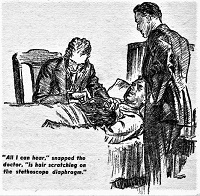Alexei Panshin is an American writer and science fiction (SF) critic. He has written several critical works and several novels, including the 1968 Nebula Award-winning novel Rite of Passage and the 1990 Hugo Award-winning study of science fiction The World Beyond the Hill.
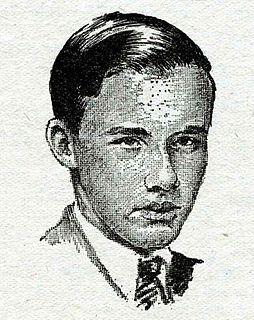
Peter Schuyler Miller was an American science fiction writer and critic.
Cory Panshin is an American science fiction critic and writer. She often writes in collaboration with her husband, Alexei Panshin. The Panshins won the Hugo award for Best Non-Fiction Book in 1990 for The World Beyond the Hill, a massive history of science fiction. Panshin is currently writing a "theory of human history as controlled by an evolving sequence of visions of the underlying nature of reality" which she is publishing in installments on her personal blog.

The Best of L. Sprague de Camp is a collection of writings by American science fiction and fantasy author L. Sprague de Camp, first published in hardback by Nelson Doubleday in February 1978 and in paperback by Ballantine Books in May of the same year. The book was reprinted by Ballantine in May 1986. It was reissued in trade paperback and ebook editions by Phoenix Pick in December 2014. It has also been translated into German.

The Wheels of If and Other Science Fiction is a 1948 collection of science fiction stories by L. Sprague de Camp, first published in hardback by Shasta and in paperback by Berkley Books in 1970. It has also been translated into German. All the stories were originally published in the magazines Astounding Science Fiction and Unknown.

Divide and Rule is a 1948 collection of two science fiction novellas by American writer L. Sprague de Camp, first published in hardcover by Fantasy Press, and later reissued in paperback by Lancer Books in 1964. The collected pieces were previously published in 1939 and 1941 in the magazines Unknown and Astounding. The first stand-alone edition of the title story was published as a large-print hardcover by Thorndike Press in September 2003. An E-book edition of the title story was issued by Gollancz's SF Gateway imprint on September 29, 2011 as part of a general release of de Camp's works in electronic form.

Science-Fiction Handbook, subtitled The Writing of Imaginative Fiction, is a guide to writing and marketing science fiction and fantasy by L. Sprague de Camp, "one of the earliest books about modern sf." The original edition was published in hardcover by Hermitage House in 1953 as a volume in its Professional Writers Library series. A revised edition, by L. Sprague de Camp and Catherine Crook de Camp, titled Science Fiction Handbook, Revised, was published in hardcover by Owlswick Press in 1975 and as a trade paperback by McGraw-Hill in 1977. An E-book version of the revised edition was published by Gollancz's SF Gateway imprint on April 30, 2014.
Advent:Publishers is an American publishing house. It was founded by Earl Kemp and other members of the University of Chicago Science Fiction Club, including Sidney Coleman, in 1955, to publish criticism, history, and bibliography of the science fiction field, beginning with Damon Knight's In Search of Wonder.
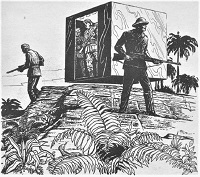
"A Gun for Dinosaur" is a time travel science fiction story by American writer L. Sprague de Camp as part of his Rivers of Time series. It tells the story of four men who travel into the past to hunt dinosaurs.
Phoenix Pick is the science fiction and fantasy imprint of Arc Manor Publishers based in Rockville, Maryland, United States.

The World Beyond the Hill: Science Fiction and the Quest for Transcendence (1989) is a book about the history of science fiction, written by Alexei Panshin and Cory Panshin. It took them about ten years to research and write, though they had made earlier attempts at writing a book on the genre.

The Best Science Fiction of the Year #2 is an anthology of science fiction short stories edited by American writer Terry Carr, the second volume in a series of sixteen. It was first published in paperback by Ballantine Books in July 1973, and reissued in May 1976.

"The Gnarly Man" is a science fiction story by American writer L. Sprague de Camp, about an apparently immortal Neanderthal Man surviving into the present day.

"Divide and Rule" is a science fiction novella by American writer L. Sprague de Camp. It was first published as a serial in the magazine Unknown from April to May, 1939 and first appeared in book form in de Camp's collection Divide and Rule. The story was revised for book publication. The first stand-alone book edition of the story was published as a large-print hardcover by Thorndike Press in September 2003. An E-book edition of the story was issued by Gollancz's SF Gateway imprint on September 29, 2011 as part of a general release of de Camp's works in electronic form.
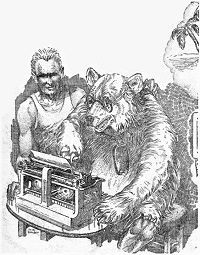
"The Command" is a science fiction story by American writer L. Sprague de Camp. An early treatment of the concept of uplift, it was the first in his Johnny Black series. It was first published in the magazine Astounding Science-Fiction for October, 1938, and first appeared in book form in the hardcover anthology Modern Masterpieces of Science Fiction. It later appeared in the paperback anthology Doorway Into Time and the subsequent de Camp collection The Best of L. Sprague de Camp. The story has also been translated into German.
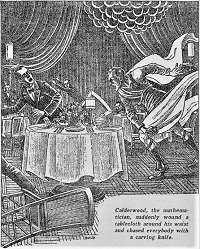
"The Isolinguals" is a science fiction story, addressing the concept of ancestral memory, by American writer L. Sprague de Camp. It was his first published story. It was first published in the magazine Astounding Stories for September, 1937, and first appeared in book form in the anthology First Flight: Maiden Voyages in Space and Time (Lancer Books, Aug. 1963; reprinted Nov. 1966 and Nov. 1969. It later appeared in the anthologies First Voyages, Tales in Time, and Wondrous Beginnings, as well as the de Camp collection Years in the Making: the Time-Travel Stories of L. Sprague de Camp.

"The Stolen Dormouse" is a science fiction novella by American writer L. Sprague de Camp. It was first published as a serial in the magazine Astounding Science-Fiction for April and May, 1941 and first appeared in book form in de Camp's collection Divide and Rule. The story has also appeared in the anthologies Astounding Stories: The 60th Anniversary Collection, and The Best of Astounding: Classic Short Novels from the Golden Age of Science Fiction.

"Living Fossil" is a science fiction story by American writer L. Sprague de Camp, on the concepts of human extinction and future evolution. It was first published in the magazine Astounding Science-Fiction for February 1939. It first appeared in book form in the anthology A Treasury of Science Fiction ; it later appeared in the anthologies Gates to Tomorrow, and The SFWA Grand Masters, Volume 1. The story has been translated into Danish, Swedish and Italian.

"The Merman" is a science fiction story by American writer L. Sprague de Camp, based on the concept of human biological engineering. It was first published in the magazine Astounding Science-Fiction for December, 1938. It first appeared in book form in the collection The Wheels of If and Other Science Fiction ; it later appeared in the anthology Science Fiction of the Thirties and the collection The Best of L. Sprague de Camp. The story has been translated into German

Lest Darkness Fall and Related Stories is an anthology of time travel alternate history stories by American writers L. Sprague de Camp, Frederik Pohl, S. M. Stirling and David Drake. It was first published in trade paperback by Phoenix Pick in March 2011.
